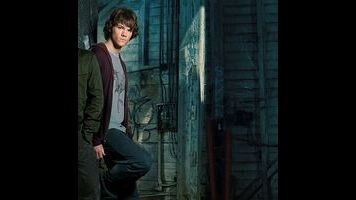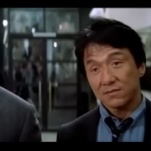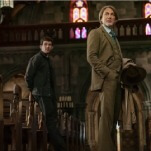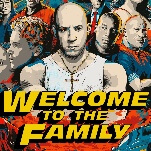The last time we saw Death was in "Two Minutes To Midnight," the penultimate episode of Supernatural's fifth season. Dean went looking for the Grim Reaper to get a certain magical ring to help in the fight against Lucifer, and the scene between them was one of the highlights of the season and one of the highlights of the show in general. The series usually stays true to its B-movie roots, practicing pulp horror with effective but rarely awe-inspiring results. Death was a rare exception, a weighty, suitably mythic presence. In the presence of the End of All Things, the series stretched itself about as far as it could go, stylistically, and that makes sense. If you're going to bust out all stops just once, you might as well do it with the one force that no one, not even the Winchesters, will ever be able to hold off forever.
Death returns in "Appointment In Samarra," and he's somewhat diminished. The actor, Julian Richings, is fine, but a good portion of his gravitas is gone. He feels less like an Old One now, and more like another member of the Winchester pantheon of grumbling ghouls. The episode starts off like gangbusters; Dean has an appointment with Dr. Robert (Robert Englund, who's given far too little to do here), because he needs to be dead for a few minutes. This accomplished, he gets in touch with Tessa, a Reaper he's dealt with before (you might remember her from Season 4's "Death Takes a Holiday" and the second season premiere, "My Time Of Dying," when she tried to reap Dean), because he wants to talk to Death about getting Sam back his soul. Tessa refuses to help—her role in this episode is to be the responsible one and vaguely disapprove of everything Dean does while pursing her lips sympathetically, but Death shows up on his own. He makes Dean a deal: He'll get Sam back, and even help the soul deal with the agony it's endured in the cage if Dean will spend one full day doing the Reaping.
It's a strong start, propulsive and suspenseful, and it introduces the story's central concept efficiently and well. It's a well-worn concept, to be sure; the difficulties of performing Death's duties have been the focus of any number of fantasy, horror, and science fiction stories, and the moral always boils down to this: People have to die when it's their time, and there's no way around it. This is one of the ways humans deal with the knowledge of their own mortality. We give it meaning by believing that it's better than the alternative, that if we were to somehow cheat Death, it would cost more lives or tamper with the fabric of reality or make all the milk go sour. And we say things like, "Without an end, life would lose all meaning," which is a nice thing to say since we lack efficient means to ever test out the hypothesis.
That's fine, though. There's nothing wrong with stories give us familiar morals. The problem with "Samarra"'s mid-section, at least on the Dean side, is that doesn't give a specific enough context for Dean's brief rebellion to make anything that happens more than going through the motions. He makes some easy kills, acts all cocky, then runs into a 12 year-old girl with a bad heart, and immediately pusses out. Obviously this was going to happen eventually (Dean is a good guy, he wouldn't be able to run through a whole day of ferrying the dead without eventually breaking down from the weight), but the episode doesn't even bother to put much effort into tugging our heart-strings. Yes, it's awful when a child dies, especially since her father doesn't have any other family. But she has no personality, and Dean's complete lack of struggle here makes him look foolish. He's a softy at heart, yes, but he's gone through more than enough over the course of the show to have made him at least a little self-aware about the dangers of breaking the natural order. There are seeds here that could've worked, but Tessa's blandness, combined with Dean's immaturity, robs the plotline of its power.
Sam's desperate attempts to keep his soul out were a bit more interesting, although the idea that he'd have to kill Bobby to do it smacked of "We have to make sure the audience realizes that a soulless Sam is a bad Sam." (It's fun how conveniently vague the spell Balthazar suggests is, too. "Oh, it doesn't have to be your actual father. Just, I dunno, have you hugged anyone recently?") Replicant Sam was more effective when he was amoral but not actually monstrous; it made it easier to sympathize with him when he objecting to having his brain torn apart just because Dean missed watching his brother cry. Once he decides to go after Bobby, though, his wishes become essentially irrelevant. It also shows a certain lack of forward thinking; sure, he's worried that getting his soul back will break him, but killing Bobby would put Dean on his trail immediately, along with every other hunter out there.
Like last week's episode, "Samarra" ended what I'd assumed would be a major plotline much quicker than expected: Sam gets his soul back. It was bound to happen eventually, but I'm a little sad to go back to Emo Sam. The threat of the magic wall Death builds to hold the memories of Hell at bay will have to be dealt with eventually, but it looks like when the show comes back in January, we're going to be getting back to our roots again, with Monsters of the Week, and, of course, the usual dose of Winchester angst. (I'm betting re-souled Sam will start telling Dean he should go back to his family. Takers?) But there is the small matter of Death's final conversation with Dean. Crowley's gone, and Sam is Sam again, but there's still something going on, and Death wants Dean to find it. Something to do with souls and the lesson Dean was supposed to learn today. This episode didn't quite live up to its premise, but I find myself very curious to learn what, exactly, Death was going on about. So far, this season has thrown out a number of interesting ideas; fingers crossed it can find someway to pull them together next year.
Stray Observations:
- "He's in agonizing pain, right?" "Uh, yes." "Give me a minute."
- So everybody who died on Dean's watch lived in the city? And it all sort of looked like the same city, too. I dug the idea that, in not killing the girl, Dean created a string of deaths that otherwise wouldn't have happened, but it never really felt that chaotic. More like, "Aw crap, I made the hot chick die? Screw this!"
- So, on a scale of one to Forrest, how stupid is Bobby? "Huh, Sam just went quiet for a few seconds in the cellar I locked him in. Better go check!" Sure, Sam really had escaped, but it could've just as easily been a trick.
- "Everything is dust in the wind." "That's it? A Kansas song?"
- The title of the episode comes from an old parable about the impossibility of escaping Death.
- Happy holidays!








































